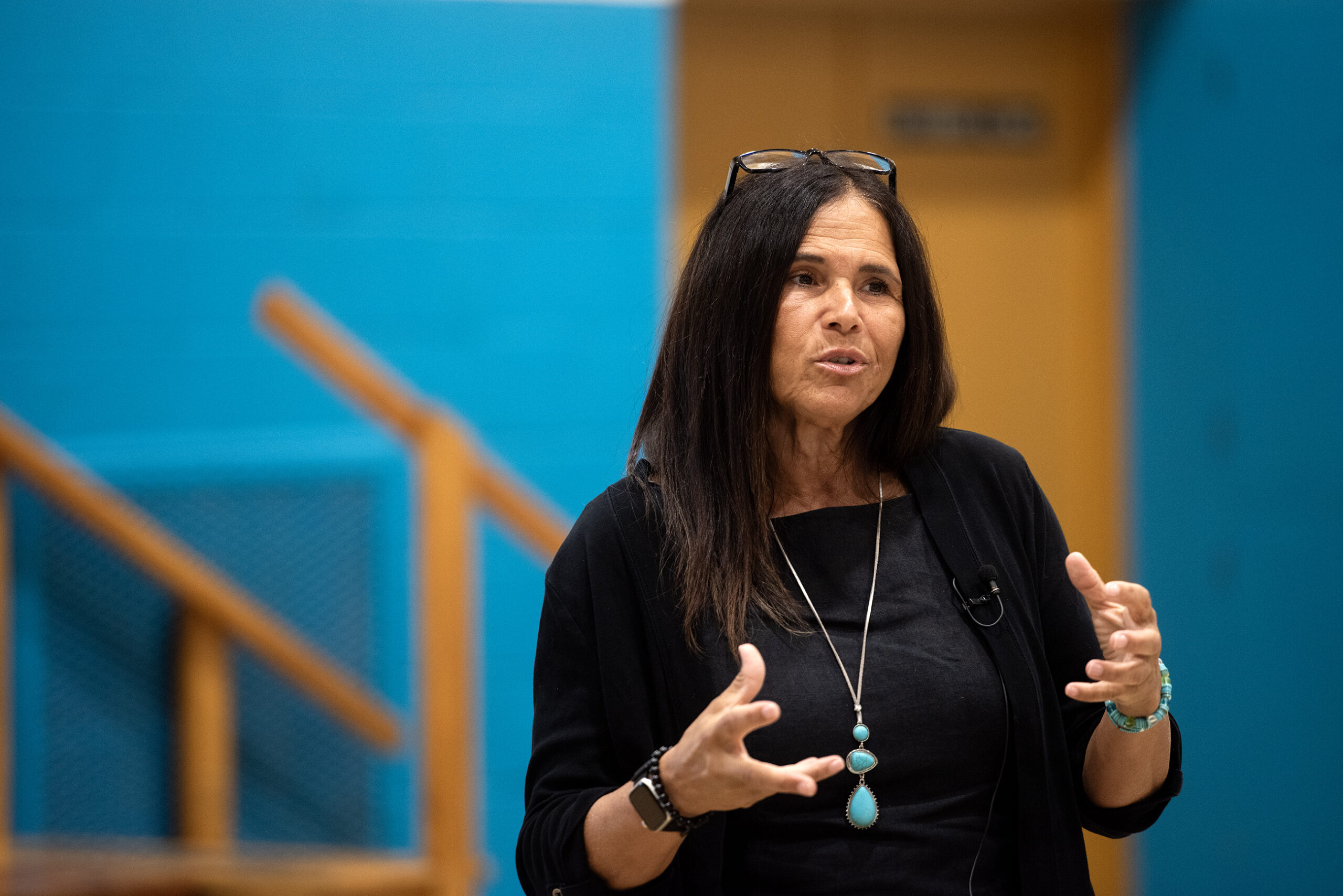Wisconsin News
New head of Milwaukee Public Schools wants to rebuild community trust. It’s an uphill battle.

By Corrinne Hess August 26, 2025 Wisconsin Public Radio
Over the summer, Milwaukee Public Schools Superintendent Brenda Cassellius held a series of community meetings asking people to share their hopes and dreams for the district.
Parents and staff members had suggestions ranging from hiring more teachers and support staff to improving the food in cafeterias to enhancing library services.
But what they really wanted to know was something more elemental: Why should they keep sending their kids to Milwaukee Public Schools?
And why should they make that decision even with a lot of signs continuing to point to “no”?
The school district has long struggled with the same issues plaguing urban school districts across the nation, including declining enrollment, rising absenteeism and funding deficits. But recently, MPS was beset by a financial scandal followed by a lead crisis.
Cassellius, who started as superintendent in March, has said rebuilding trust within the community is one of her most important jobs. But doing so will be challenging.
One of the parents who attended a community meeting was Kate Spevak. She came to Cassellius’s July 28 listening session at Congress School on the city’s west side.
Spevak said she has a strong commitment to public schools and has worked at MPS for nine years. Now her own son is starting school in the district.
She told Cassellius her husband would like their family to leave the city. She wants to be able to give him good reasons to stay.
“I have several hopes and dreams. I want (my son) to stay in MPS. I want him to go to high school in MPS. And the state of things right now, I don’t know if that is going to be the case,” Spevak said.
When Cassellius took over as superintendent in March, she knew immediately one of her toughest jobs would be changing the public’s opinion of the embattled district.
Before the listening session, Cassellius told WPR the most important thing she can do is show up and listen.
“I can’t just come in with big plans. I need to make those big plans with the community,” Cassellius said. “I’ve said all along that this is going to be community-led and community-driven, and these listening sessions are a way to be able to demonstrate that to the community.”
Cassellius arrived in Milwaukee after the school district faced one of its most tumultuous years in recent memory.
First, there was a battle to convince taxpayers to boost district funding through a hefty property tax increase. By a margin of just 1,720 votes, voters approved a $252 million referendum in April 2024.
But just one month later, financial mismanagement by former Superintendent Keith Posley and several members of his team was revealed.
The problems came to light when the state Department of Public Instruction withheld millions of dollars in state funding because the district had been missing deadlines for required financial reporting despite warnings. The ensuing uproar prompted Posley and several others to resign.
Longtime education activist Howard Fuller said the challenges Cassellius faces are “enormous.”
“I have never seen MPS in as weak of a political position,” Fuller said. “I think that referendum and the incompetence and the deceit that surrounded it eroded support for MPS in places where you would normally have very strong support.”
Fuller served as the district’s superintendent from 1991 until 1995. When he left, there were more than 96,000 students. Thirty years later, about 53,000 students attend MPS schools.
“(The district) not only has issues, because every district has issues, but I’m afraid that the level (of) political support is not there,” Fuller said. “It gives (Cassellius) far less room to do certain things.”
Since coming to Milwaukee, Cassellius has spent a lot of time in the community. She meets with nonprofits, business groups, parents and reporters weekly.
And she said she’s heard that the fallout from after the referendum passed has damaged the school district’s reputation.
But she also hears excitement about the future. Cassellius even believes the public will support another referendum if needed.
“You know, (the referendum) did pass,” she said. “I feel like if we can demonstrate fiscal prudence, if we can demonstrate the need, if we can demonstrate operational excellence, and if we start getting results, I think that the public and the citizens of Milwaukee will pass (another) referendum.”
Following the financial scandal, Gov. Tony Evers ordered two independent audits of the district.
The first, released in February, focused on operations and procedures at MPS.
It found that the district is not adequately supporting its schools nor ensuring student success. “This is caused by multiple failures, including an absence of clear vision and leadership routinely disempowered to lead,” the audit said.
The second audit, released in June, was focused on instructional policies.
That report was equally critical, with auditors stating that the district isn’t supporting its teachers and lacks adequate systems in place for student learning at its schools.
The second audit also found literacy instruction is inconsistent, contributing to low rates of reading proficiency. Fewer than 40 percent of children in kindergarten, first and second grade are proficient in reading.
Cassellius has been responsive to Evers’ audits, saying MPS will “act with urgency and purpose to get every child reading on grade level.”
But it’s not going to be easy.
The reading proficiency is even lower in certain parts of the city. In the central city, only 22 percent of children are reading at grade level, according to the audit.
During the July 28 community listening session, parents Krista and John said they have two children enrolled at a small school in MPS that doesn’t have a full-time librarian.
“We talk about things like access to literacy, and they love to read, but it’s only as often as someone can let them into the library,” said Krista, who did not give her last name.
She compared her child’s school to “some of these other schools that have gotten update after update” and said she “would love to see a little more spreading of the wealth, especially if we are all under the MPS umbrella.”
Cassellius acknowledged that it is tough to provide opportunities for students at smaller schools.
She said that over the next year, the district will consider merging some schools and closing some of the district’s 149 school buildings.
“It’s nothing anyone wants to hear, but I have to bring the tough conversation to the community and make some choices, too,” Cassellius said.
Financial instability and student performance issues were already top of mind over the last year when another crisis came to light. Parents and guardians at Golda Meir School, one of the district’s top-performing schools, were notified in January that a student had lead poisoning.
From there, the issue snowballed, revealing dangerous levels of lead contamination at multiple schools.
The problem forced the temporary shutdown of nine schools. The district has spent $25 million on lead remediation as crews rushed to make repairs over the summer.
A new problem arrived just weeks before students were scheduled to return to school. Record-setting flash flooding in early August damaged 22 school buildings and slowed lead remediation efforts that have been underway.
Cassellius said all of these issues have proved that Milwaukee and schools across the state need more support from the Legislature.
Unlike her predecessor, Posley, who spent decades working at MPS, Cassellius comes to Milwaukee via Minnesota and Boston.
But she said her upbringing and past experiences allow her to connect with families in a different way.
The district is 50 percent Black and 28 percent Hispanic. More than 83 percent of families are economically disadvantaged.
Cassellius grew up in public housing with a single mother.
Cassellius was a single mother herself for many years, starting her career in special education as a paraprofessional and then putting herself through college with a Pell Grant for low-income students.
“My purpose for being on this Earth is to wake up every day and make a difference for children and their families because I believe children come not just themselves, but they come in full systems,” she said.
On countertops across the conference room at the district’s central office are poster-sized doodle boards from the nine summer listening sessions.
When parents, teachers and community members spoke, their hopes and dreams for the future were written down.
Cassellius will take these boards to a future meeting with the Milwaukee Board of School Directors, where the ideas will be used to shape future policy.
The message Cassellius said she heard from parents at those meetings wasn’t “tell me why I should stay in the district,” but rather “let’s make it better.”
“Yes, Milwaukee has a very hyper-competitive environment for choice for families, but that’s not our issue in Milwaukee Public Schools,” she said. “The people here are committed to the school district.”
At Congress School, Cassellius spent more than an hour listening to parents and teachers like Spevak share their hopes and dreams for the school district.
For the last nine years, Spevak has been a speech pathologist with MPS. She said she wants to spend her career with the district.
But she said the last year has been a struggle.
“My hopes and dreams are that we, as a support staff, are supported at the school level and by the administration by allowing us to provide those services in a safe and supportive environment,” she said. “That’s my biggest hope, that we can still provide those services for our most vulnerable children and that my son stays with MPS for his entire academic career.”
Cassellius didn’t exactly have an answer. But in her response, she told a story about how her commitment to public education played out in her own family.
She told Spevak that when she was working in Minneapolis, she was renting a house and her children were enrolled in one of the city’s best schools.
But after a zoning change, her children were assigned to a lower-performing school.
Cassellius’s family was grandfathered into the higher-performing school, but because of her steadfast belief in all public schools, she kept her children where they were now zoned, in the lower-performing school.
“I felt it was important to be part of the community (and) be part of that change,” Cassellius said. “I hope we can win your trust, and as a staff member, you’ll be able to see it up close. Hoping to have safe and welcoming schools, I think it’s important to build community that way.”
Wisconsin Public Radio, © Copyright 2025, Board of Regents of the University of Wisconsin System and Wisconsin Educational Communications Board.


